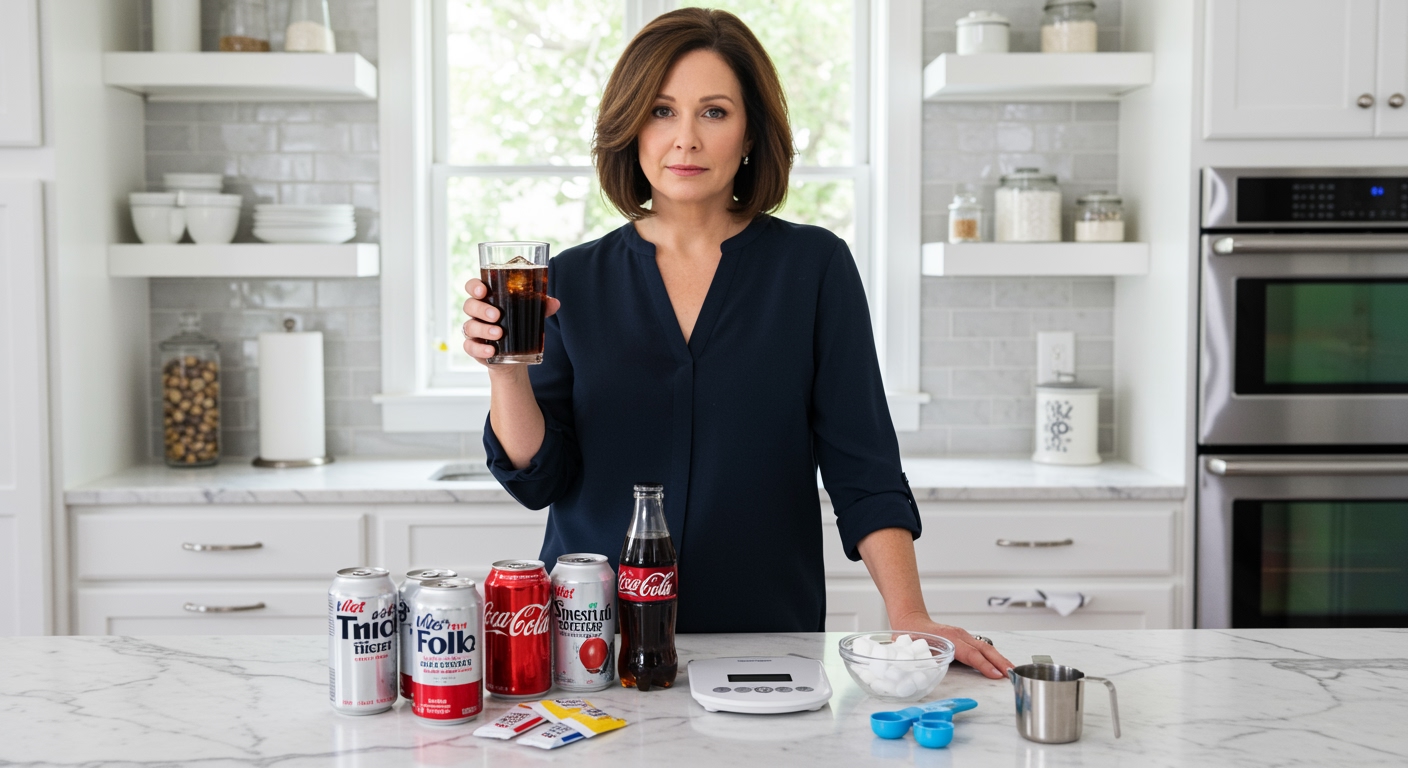✪ Key Takeaway: Diet sodas disrupt metabolism and increase cravings more than regular sodas, leading to greater weight gain over time.
Introduction
You reach for that diet soda thinking you made the smart choice for your waistline.
The zero-calorie promise seems perfect, but your scale keeps climbing higher each month despite drinking diet instead of regular sodas.
Hi, I’m Abdur, your nutrition coach, and today I’m going to explain why diet sodas actually trigger more weight gain than their regular sugar-filled counterparts.
How Do Artificial Sweeteners Confuse Your Brain?
Your brain expects calories when it tastes something sweet.
Artificial sweeteners like aspartame, sucralose, and acesulfame potassium deliver intense sweetness without any calories.
This mismatch creates a neurological confusion that disrupts your body’s natural hunger and satiety signals.
Research shows that when your brain detects sweetness but receives no calories, it triggers compensatory mechanisms that increase your appetite for high-calorie foods.
The hypothalamus, your brain’s hunger control center, becomes dysregulated when exposed to artificial sweeteners regularly.
This dysregulation leads to increased food cravings, especially for sugary and fatty foods, within hours of consuming diet sodas.
✪ Fact: Your brain processes artificial sweeteners 600 times sweeter than regular sugar, creating intense cravings.
Why Does Your Metabolism Slow Down With Diet Sodas?
Diet sodas contain zero calories, but they still impact your metabolic rate negatively.
Artificial sweeteners alter your gut microbiome, the collection of bacteria in your digestive system that plays a crucial role in metabolism.
Studies reveal that people who drink diet sodas regularly have different gut bacteria compositions compared to those who avoid artificial sweeteners.
These bacterial changes reduce your body’s ability to process glucose efficiently, leading to insulin resistance over time.
When your cells become resistant to insulin, your body stores more calories as fat instead of using them for energy.
Additionally, artificial sweeteners interfere with the production of GLP-1, a hormone that regulates blood sugar and promotes feelings of fullness.
Lower GLP-1 levels mean you feel hungrier more often and have less control over your food intake throughout the day.
✪ Pro Tip: Track your hunger levels for one week after eliminating diet sodas to see the difference.
What Makes Regular Soda Less Harmful For Weight?
Regular soda contains actual sugar calories that your body recognizes and processes normally.
When you drink regular soda, your brain receives the expected caloric load and adjusts your appetite accordingly.
This natural feedback loop helps prevent the compensatory overeating that occurs with artificial sweeteners.
Your pancreas releases insulin in response to real sugar, which signals your brain that you have consumed calories.
This proper signaling helps maintain your body’s natural satiety mechanisms and prevents the metabolic confusion caused by artificial sweeteners.
Regular soda also does not disrupt your gut microbiome in the same way artificial sweeteners do.
While regular soda still contributes empty calories, it does not trigger the same neurological disruption that leads to increased overall caloric intake.
✪ Note: Neither option is healthy, but regular soda causes less metabolic disruption than diet versions.
How Do Diet Sodas Increase Your Total Daily Calories?
The zero calories in diet soda become meaningless when they trigger you to eat 300-500 extra calories throughout the day.
Research tracking diet soda drinkers found they consumed significantly more calories from other sources compared to people who drank regular soda.
Artificial sweeteners create intense cravings for high-calorie foods, particularly those rich in sugar and fat.
These cravings typically strike 2-4 hours after consuming diet soda, when your brain realizes it did not receive the expected calories.
Many people unconsciously reach for cookies, chips, or other snacks to satisfy these artificial sweetener-induced cravings.
The psychological effect also plays a role, as people often justify eating more because they “saved” calories by choosing diet soda.
This compensation behavior leads to a net increase in daily caloric intake, resulting in gradual weight gain over time.
✪ Fact: Diet soda drinkers consume 200% more desserts and snacks compared to water drinkers.
What Should You Drink Instead For Weight Management?
Water remains the best choice for weight management and overall health.
If you crave flavor, add fresh lemon, lime, cucumber, or mint to your water without any artificial additives.
Unsweetened tea and coffee provide antioxidants and can boost your metabolic rate naturally.
Sparkling water with a splash of 100% fruit juice gives you bubbles and taste without artificial sweeteners.
If you must choose between diet and regular soda occasionally, opt for the regular version in smaller portions.
Your body can handle the natural sugar better than the metabolic disruption caused by artificial sweeteners.
Focus on gradually reducing your dependence on sweet drinks by slowly decreasing frequency rather than switching to artificial alternatives.
The Bottom Line
Diet sodas create a perfect storm of metabolic disruption, increased cravings, and compensatory overeating that leads to more weight gain than regular sodas.
The path to lasting weight management lies in choosing foods and drinks that work with your body’s natural systems, not against them.
I would love to hear about your experiences with diet sodas and weight management in the comments below, so please share your thoughts or questions.
References
At NutritionCrown, we use quality and credible sources to ensure our content is accurate and trustworthy. Below are the sources referenced in creating this article:
- WebMD: Diet Sodas and Weight Gain: Not So Fast
- Frontiers in Nutrition: Artificial Sweeteners and Metabolic Effects
- PMC: Artificial Sweeteners and Glucose Intolerance
- Time: Why Diet Soda Makes You Gain Weight
- Medical News Today: Artificial Sweeteners Impact on Glucose and Insulin

